UX | STRATEGY, DESIGN, RESEARCH
PRIVACY AT XING
XING, the largest professional social network in the German-speaking area makes its handling and attitude towards data privacy transparent with a dedicated website, a so-called 'privacy hub'.
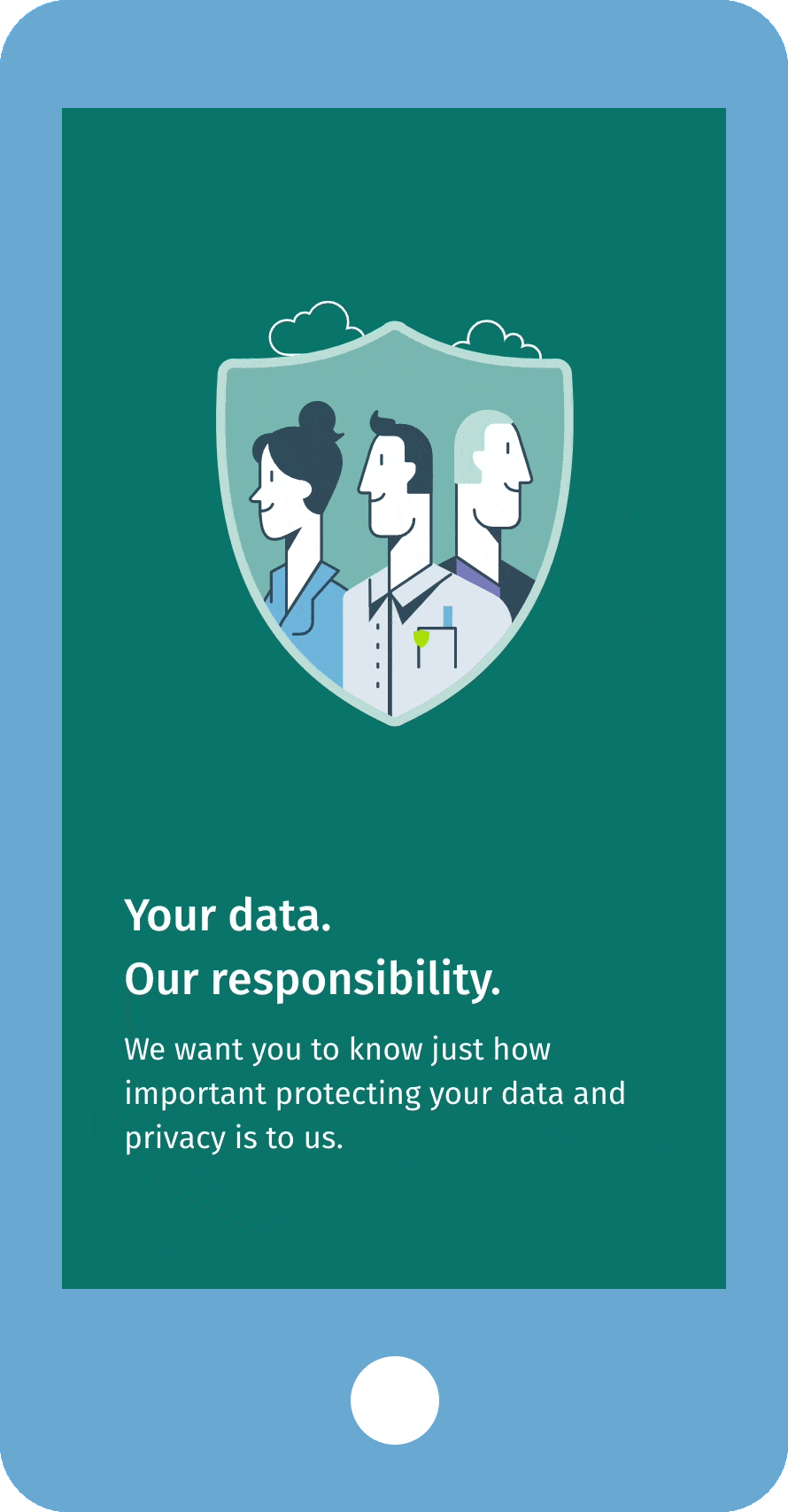
Client:
XING SE
Duration:
6 Months
HOW MIGHT WE...
1. Introduce to the topic of data privacy at XING in an easy to understand and compelling storytelling-format?
2. Give transparent explanations of privacy when using the XING network - from a short summary right down to the adjustment of individual settings?
3. Create a userfriendly privacy policy that makes it easy to get an overview and deepen topics of interest?
SOLUTIONS
Playful, yet serious storytelling.
The home page of the privacy-hub is about the history of the XING network and its attitude towards delicate data of its members. Using a forced scrolling technique, the visitor is guided from one ‘chapter’ to the next, and drawn into the story. Colorful, short animations emphasize each respective core statement.

Every privacy topic provides contextually fitting links into individual settings.
After the introduction, visitors are guided to the privacy area. Here they find explanations for the most important privacy settings of the network and from there, if interested, either get to the respective legal background or into their individual platform settings.
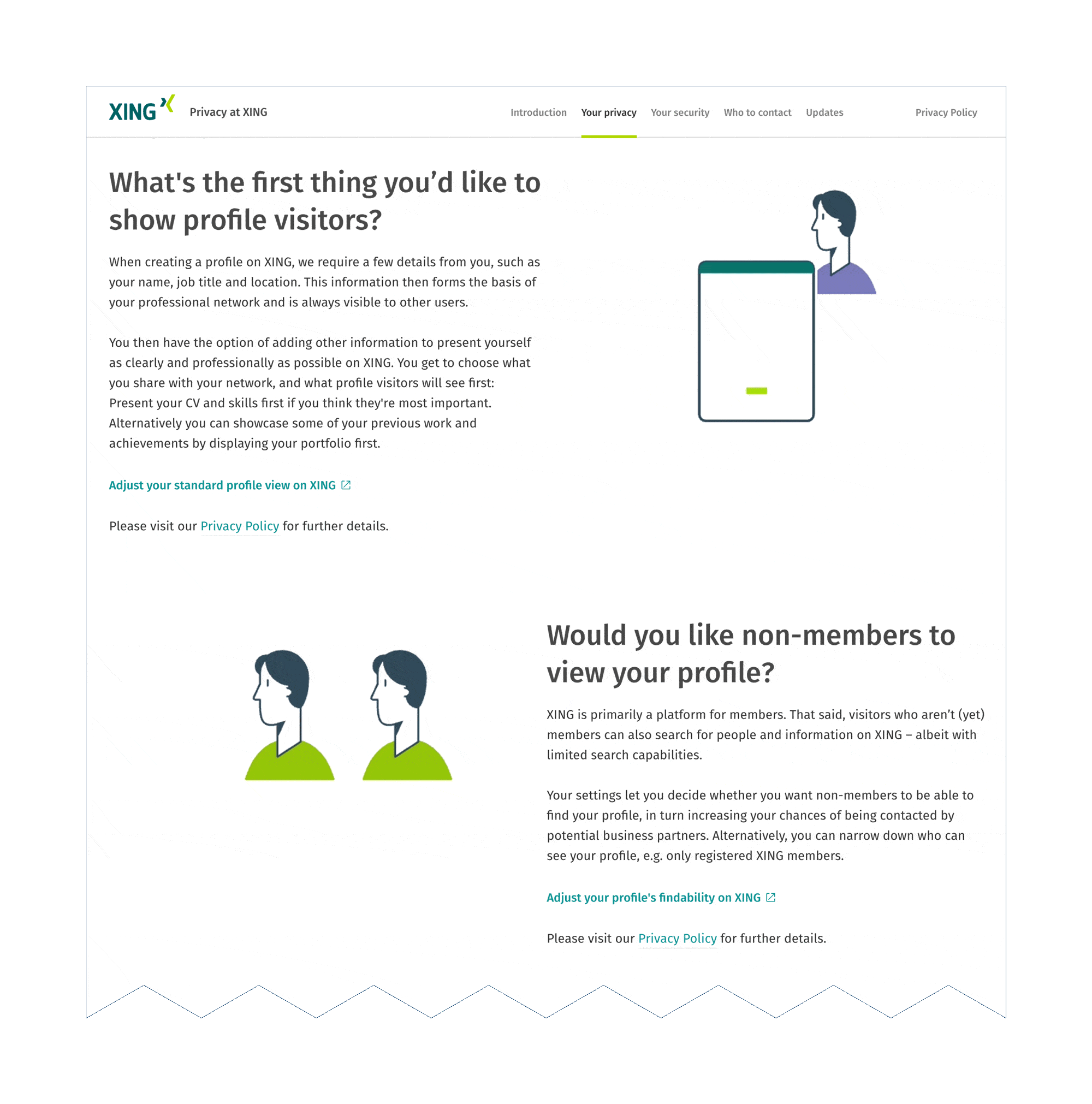
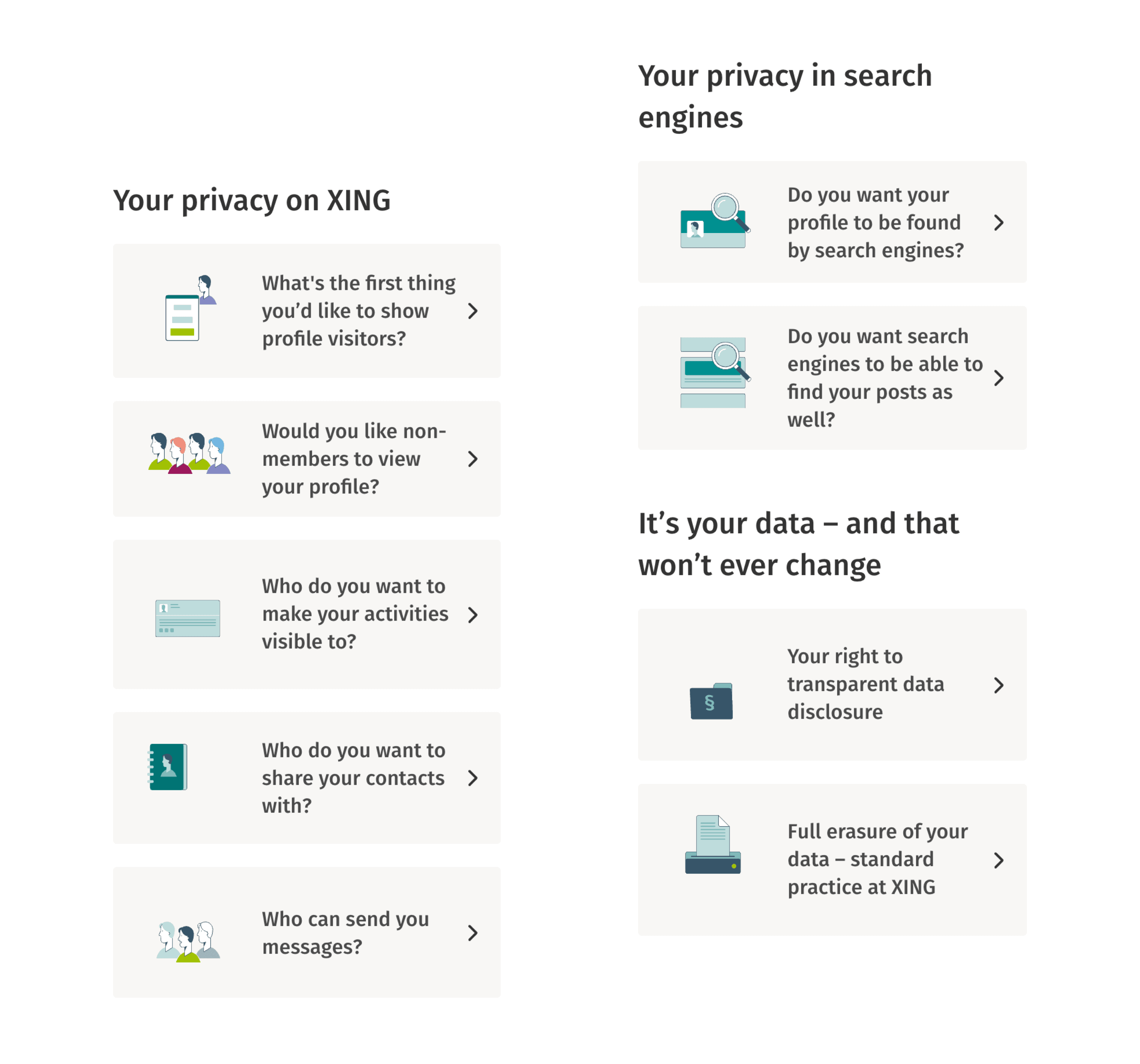
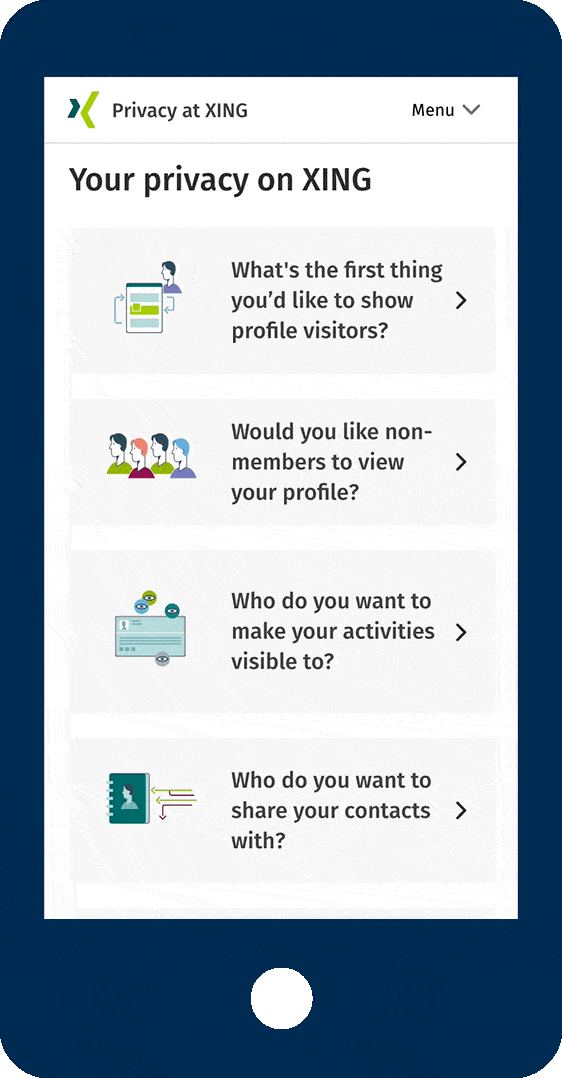
The privacy policy is now divided into several levels instead of a long text.
This allows a targeted intensification in topics of interest. The content for each sub-topic is summarized so that visitors get an overview and can decide whether the respective information is sufficient or they want to deepen a topic. At the lowest level, the legal background can be found and, for example, tracking settings could be changed instantly.
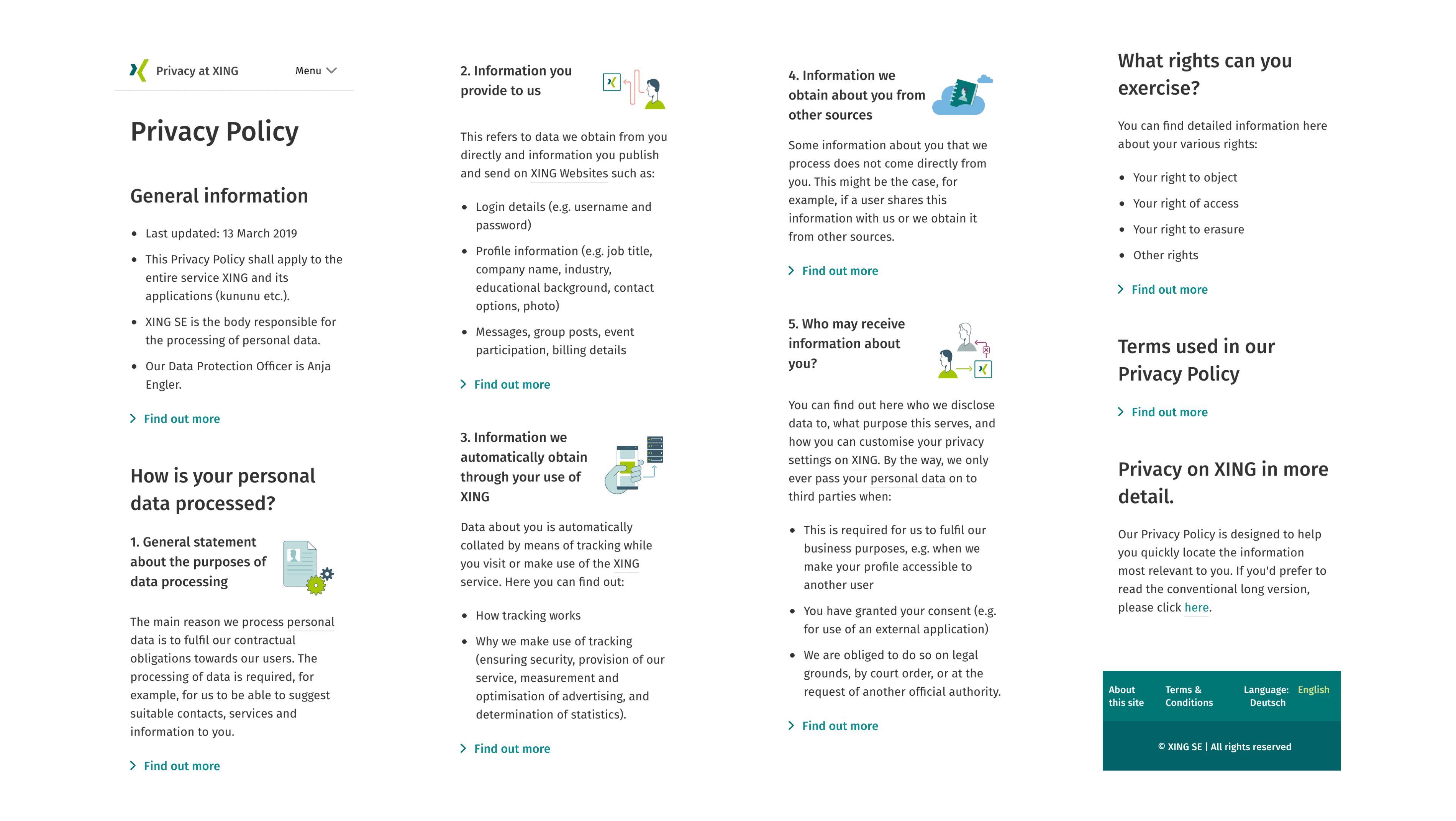
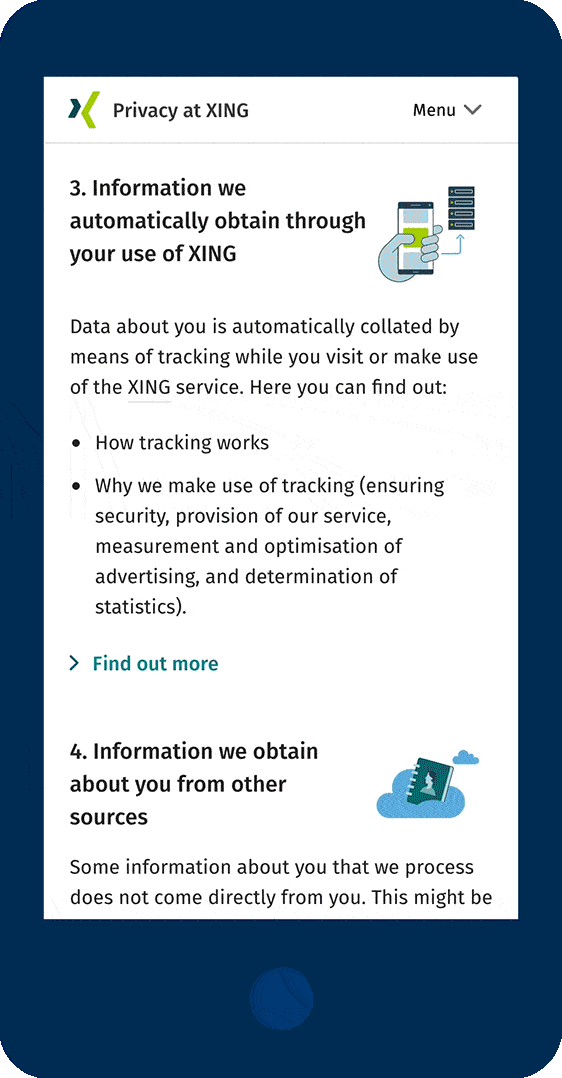
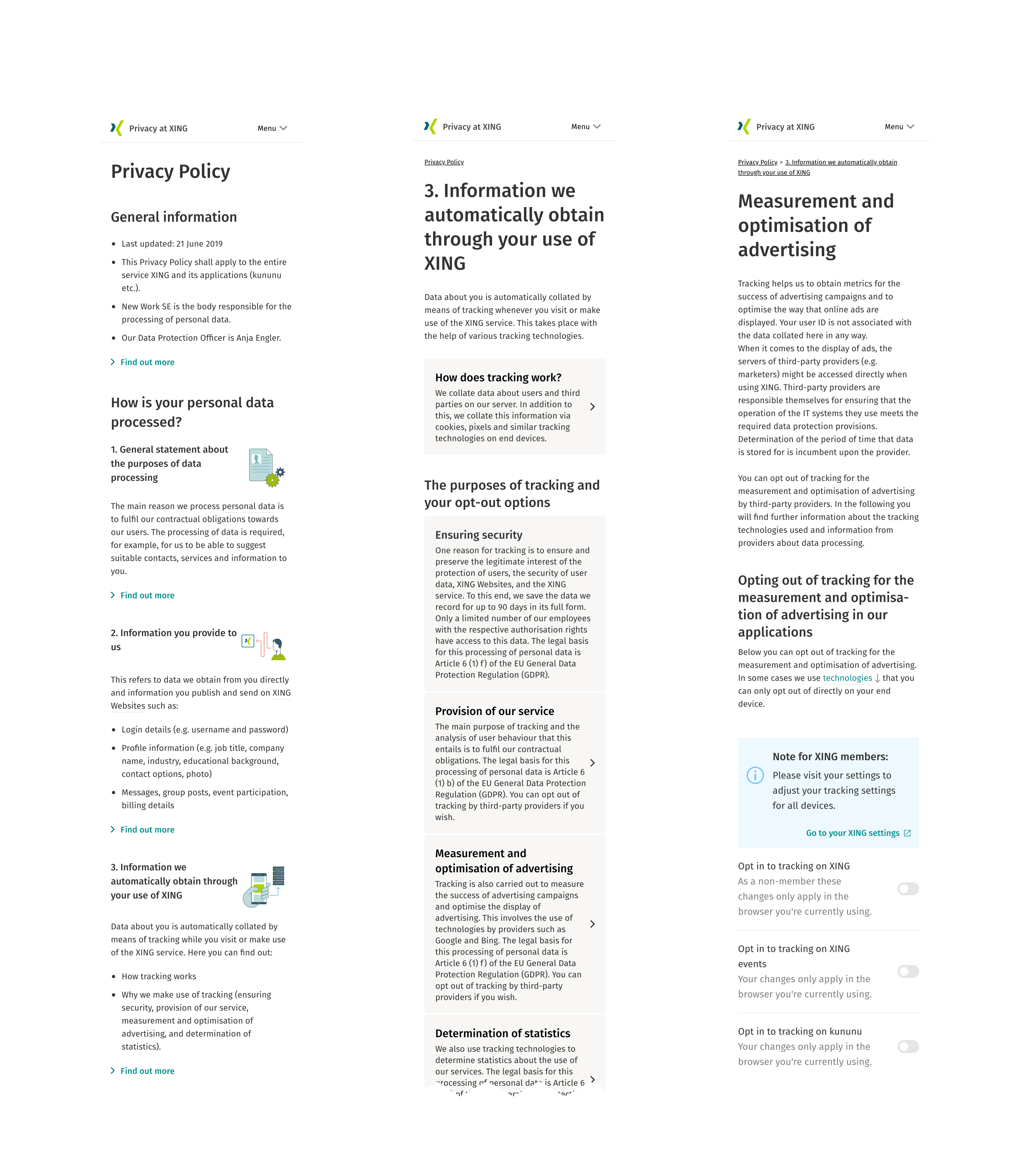
DESIGN PROCESS
STAKEHOLDER WORKSHOPS & IN-DEPTH INTERVIEWS
Members always felt that their data was in safe hands.
Since the project was situated outside the normal duties of the agile product teams, a temporary functioning team was assembled. Core stakeholders for this project belonged to the marketing, legal and the online-security departments.
I startet by running several workshops with all stakeholders involved, as well as conducted one-on-one interviews, to understand everyone’s expectations and requirements in regards to the content and scope of the privacy hub.
Concurrently, interviews of XING platform members focused on their personal thoughts and feelings towards saving private and professional data on XING servers. In summary, even members who described themselves as being rather sensitive and critical felt that:
- their data is in discrete and safe hands.
- the capturing and processing for personal data by XING made sense and is necessary for the network’s proper functioning.
- they currently are in full control of their personal data.
From the interviews, two primary target groups for the privacy hub emerged.
Primary and secondary target group with their individual needs.
GOALS & UX PRINCIPLES
Shared objectives ensured that needs of users and the company would be considered.
The collected insights laid the foundation for all subsequent strategic decisions. Deriving from the findings, I started by describing the basic goals for users, the company and the XING brands and validated these with the involved stakeholders.
In addition, I defined high-level principles for the interactions and the user experience on the hub, to ensure special needs of users and the company would be considered as well. These principles guided the project team and helped them to be on track, both in terms of basic alignment of the policy hub, as well as for detailed questions and to justify decisions in front of other stakeholders.
Project objectives for user, business and brand + 3 UX principles.
INTEGRATION WITHIN THE XING COSMOS
One privacy policy for all XING brands - an easy updating and maintenance system.
The privacy hub with its privacy policy was meant to act as an overarching umbrella platform, providing centralized access for all users of XING and its sub-brands. For this, links were placed or replaced in all the footers of the associated websites.
XING and all of its subbrands link to the hub and the policy via their footer. The hub links contextually into individual member settings.
INFORMATION ARCHITECTURE
The flat privacy hub contains a deep privacy policy.

Sitemap of the privacy hub and the policy (yellowish background).
STORY FORMAT
We decided for short, concise texts combined with fullscreen animations (V1).
Considerable time was spent comparing and testing various forms of storytelling options as well as variations of user-interaction possibilities. After several rounds of user testing the decision fell on a version, where visitors can skim over the rational texts rather quickly and are also left with emotional impression through the animations.

Story-explorations for the homepage.
USER GUIDANCE
Finetuning the storyline and overall amount of content.
Wireflows made the overall story-flow of the page apparent and displayed the navigation paths on the page itself as well as onto external pages. Based on them the team discussed the order and weighting of content. Because the page does not have many subpages altogether, the individual wireframes were populated with real texts to estimate the length of the pages.
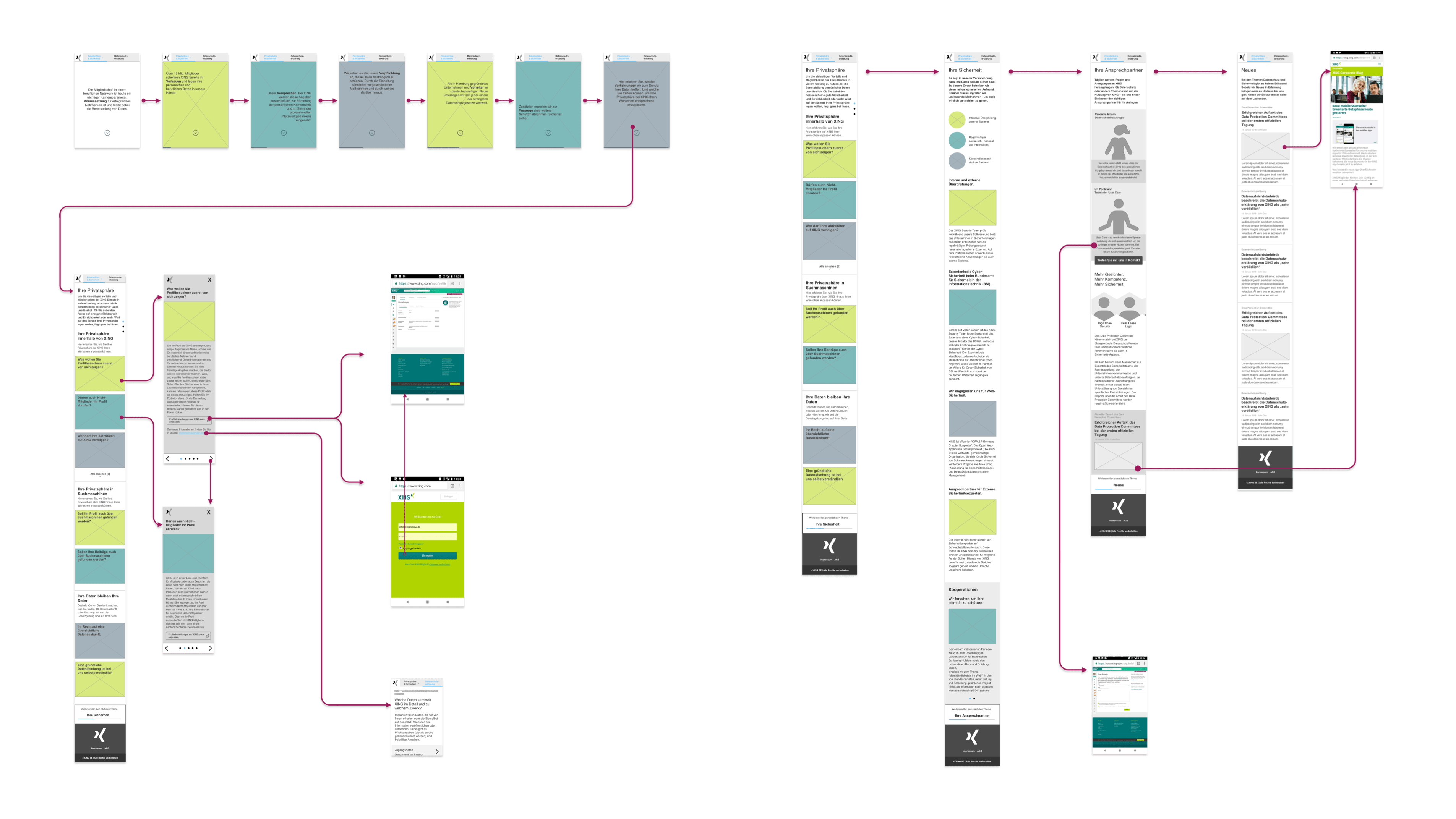
Mobile wireflow of the privacy-hub.
TESTING, TESTING, TESTING
An idea without a test is just an idea.
The entire development process was accompanied by regular smaller and larger UX tests on mobile and desktop devices. User guided us the way about how much text was optimal, which story format is the easiest to comprehend and how the privacy policy should be summarized to bite-sized chunks.
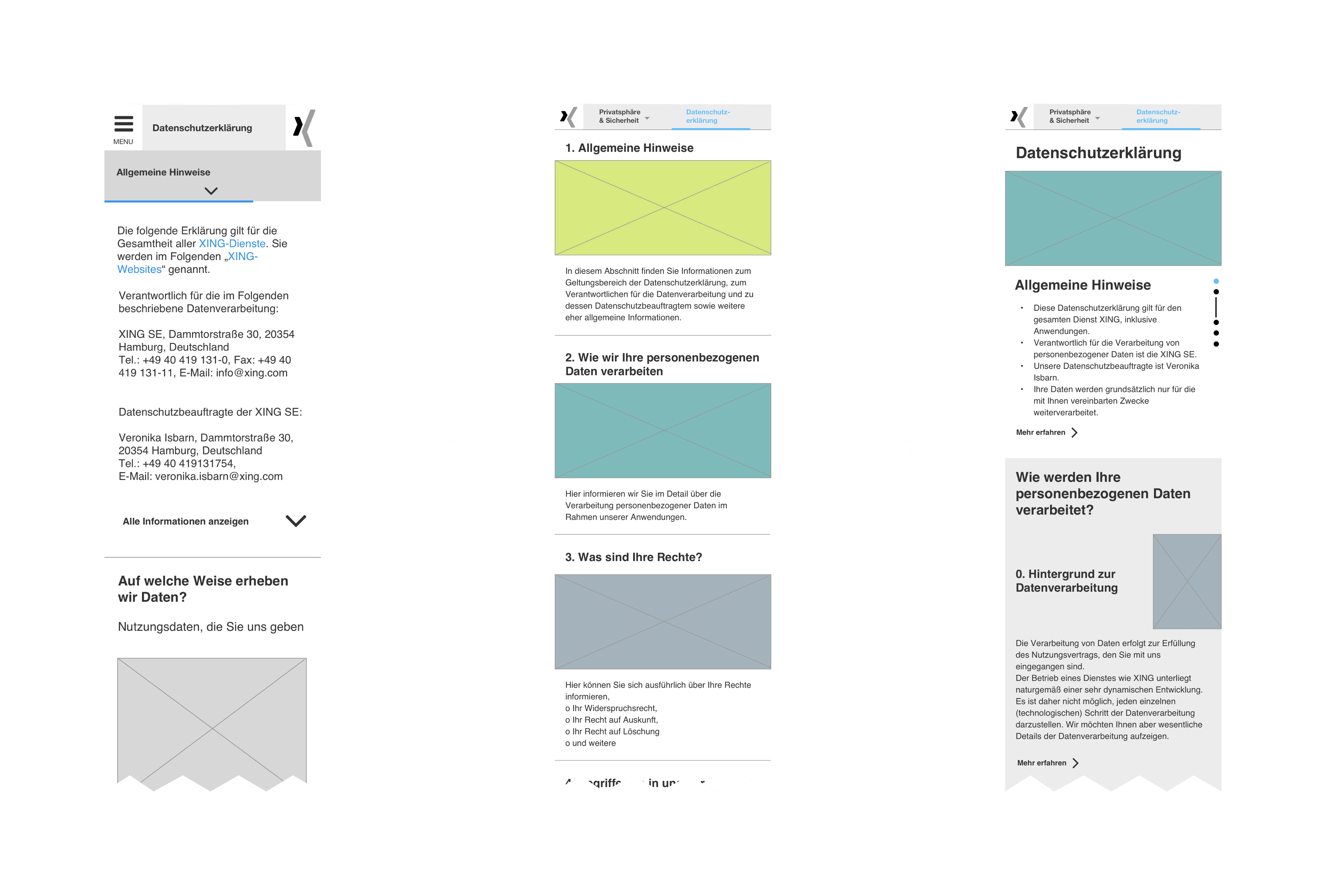
Prototype-Evolution.
DESIGNING & PROGRAMMING
And BOOM - it was made.
The concept was illustrated, animated, designed and implemented by the digital agency BOOM from Hamburg. We collaborated closely to ensure that the essential ideas are not just implemented as intended, but also that the user experience was maximized. Nevertheless, one or the other darling had to be killed due to time or complexity reasons.
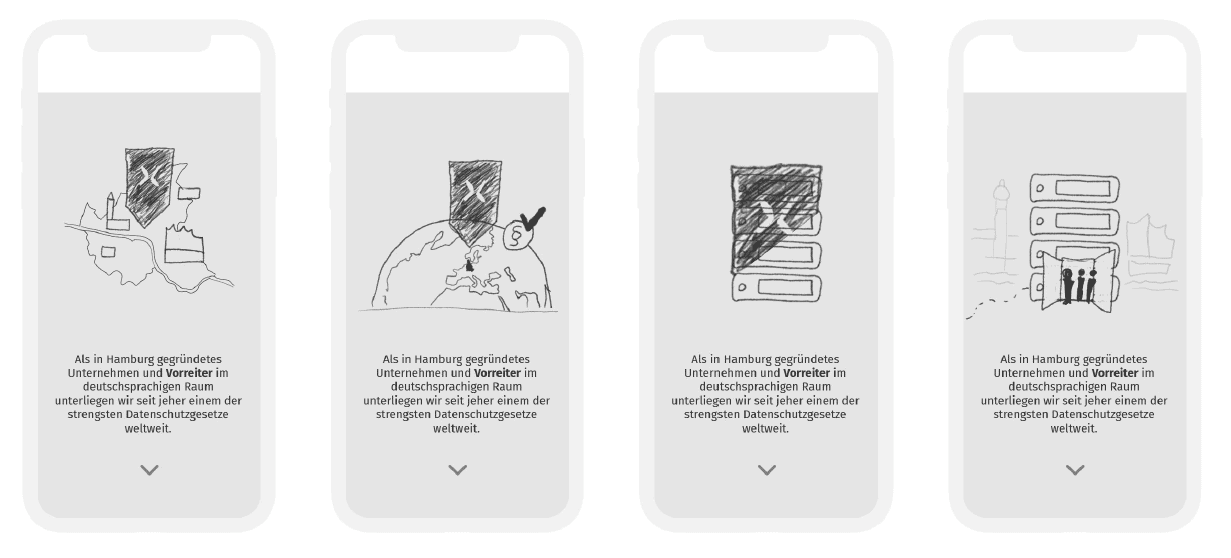
Scribbles for the homepage animations done by the digital agency BOOM.
LAUNCH
The Privacy Hub was launched at the end of April 2018. The Executive Board/CEO announced this development to all XING members via an e-mail. Due to the great attention paid to the GDPR, the site was increasingly used by members to inform themselves about security precautions or to obtain data information.
The data protection officer of the city of Hamburg especially praised the privacy hub for its high transparency and its exemplary preparation of the data policy. A number of blogs have also made positive comments on how XING carried out the initiative.
MY ROLE
- Requirement-Analysis (Stakeholder- Interviews & -Workshops, User- Interviews)
- Wireframes (mobile first) & Wireflows
- Prototypes
- Information Architecture & Sitemap
- In-Depth User-Interviews
- Navigational concept for privacy policy
- Close collaboration with digital agency BOOM
BOTTOM LINE
The working atmosphere at XING can be characterized by a familiar and constructive-feedback valuing work culture. In addition, the project was interesting in terms of the political aspects: The team was specially set up for this project and the diverse stakeholders hence had different ideas and requirements. For me it was an inspiring task to listen carefully, reading between the lines and find the right arguments to stay user centric.
Until then, I had not had the opportunity to work with and for a product company that really integrates UCD principles into their corporate DNA and integrates every detail of user testing in their day-to-day work. The UX design and research colleagues at XING are particularly experienced and incorporate the necessary sensitivity and empathy into their work. This user-oriented collaboration has taught me once more that it is very important as a designer to keep in mind that the user knows better.
Let's get in contact
Bibiana Meya
Phone: +49 176 326 20 251
Email: info@bibianameya.de





